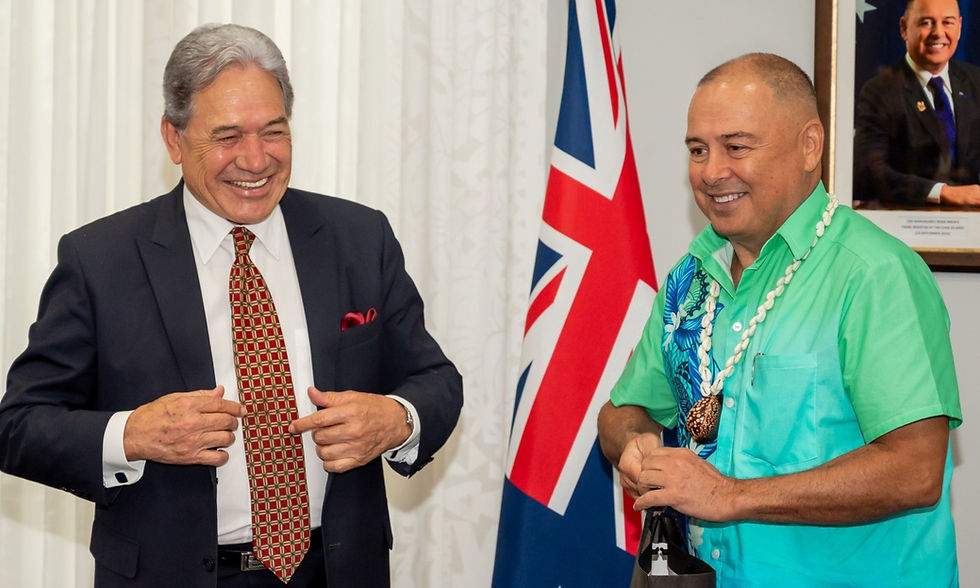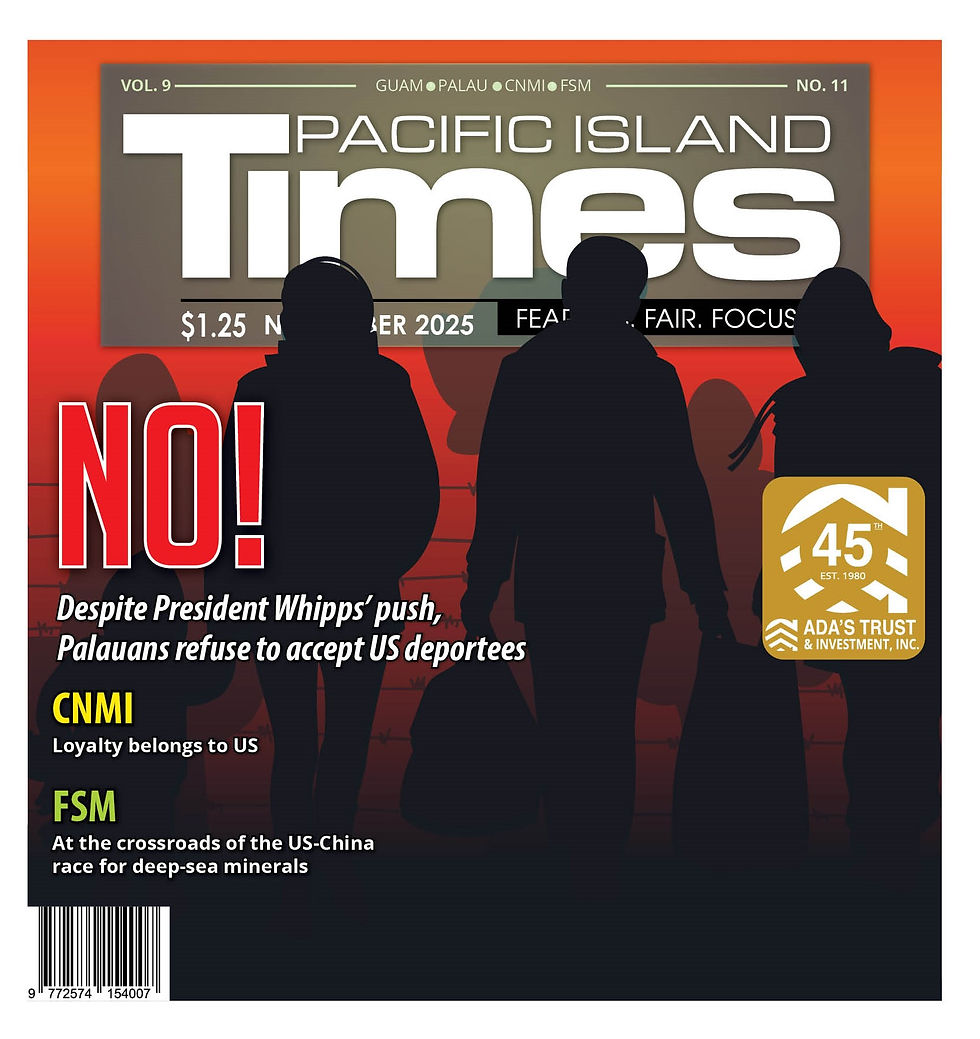Obligation to the Realm: a cautionary tale of the Cook Islands
- Admin

- Nov 20, 2025
- 4 min read

Obligation to the Realm: a cautionary tale of the Cook Islands
By Sione Tekiteki
Rarotonga—The New Zealand Realm, the collection of states that includes New Zealand itself, the Cook Islands, Niue and Tokelau, is often associated with colonial legacies.
While the Cook Islands is part of the Realm, its relationship is described as one of “free association”: two self-governing states cooperating by choice on functions such as defense, external affairs and citizenship.
But as the Cook Islands has discovered since signing a suite of agreements
framed by the Comprehensive Strategic Partnership with China in February 2025, the “free” proves to be less important than the “association” in more contested times.
Unlike the U.S. Compact states—Palau, the Federated States of Micronesia and the Marshall Islands—whose free association with the United States is defined by treaties between sovereign equals, the Cook Islands’ status sits within a constitutional framework created by New Zealand's 1964 Cook Islands Constitution Act.
As a New Zealand statute, this carries inherited mechanisms of oversight and an underlying convention of consultation with the sovereign through New Zealand which, as a convention, is not legally binding. This creates a structural tension between autonomy and expectation—one that defines the relationship’s enduring constitutional ambiguity and explains why “consultation” remains a contested term.
This constitutional arrangement helps explain why the Cook Islands and Niue behave like sovereign states internationally, yet lack the constitutional architecture typically associated with full independence. Both enjoy an international legal personality.
They can sign treaties and join specialized agencies, but they are not full United Nations members. It’s not that they can’t join, but to signal interest in full U.N. membership would inevitably raise questions about the nature of their free association with New Zealand, especially in relation to citizenship.
The barrier is not international recognition (the Cook Islands established formal relations with China in 1997, and the U.S. in 2023) but sensitivities in Wellington.
The latest flashpoint in Realm politics is a letter released under the Official Information Act from New Zealand Foreign Minister Winston Peters to Cook Islands Prime Minister Mark Brown, suspending further aid to the Cook Islands government, totalling nearly NZ$30 million over two years.
Dated Oct. 13, the letter raises New Zealand’s concerns “about the Cook Islands’ approach to the constitutional realities which impose clear limits on your freedom to act on foreign affairs, defence and security matters without reference to New Zealand’s interests or those of the Realm."
The language suggests a shift toward a more restrictive reading of free association. While the Cook Islands has the constitutional authority to conduct its own foreign policy, the letter effectively recasts that autonomy as subject to an obligation, stretching the “duty to consult” in the 2001 Joint Centenary Declaration into a “duty to account” for New Zealand’s interests. In practice, it reverses years of normalized autonomy, replacing this with an expectation of obligatory alignment and a principle of “no surprises."
Reading between the lines, the letter suggests that New Zealand is seeking more formal assurance from the Cook Islands beyond the 2001 Joint Centenary Declaration.
New Zealand’s Prime Minister Christopher Luxon has said, “We’re very clear about what the asks are and what we need reassurance around, and we need to see a response from the Cook Islands to restore that trust.”
Reports from earlier in the year indicated Wellington was exploring the use of “strategic trust” clauses in future Pacific agreements, effectively requiring New Zealand’s consent before any partners enter any agreement with security implications. This mirrors Australia’s approach in the wider region.

The new Political Declaration signed on Nov. 13 between Niue and New Zealand reflects this trajectory. Clause 5 makes this explicit, stating that Niue must pursue its foreign policy “consistently with its enduring alignment with New Zealand’s fundamental interests,” a formulation that leaves the definition of those interests in Wellington’s hands. This is presumably the same assurance New Zealand seeks from the Cook Islands.
OIA-released MFAT briefings noted that the Cook Islands did not “see why they should consult their plans with New Zealand, noting that New Zealand did not consult Rarotonga on its Comprehensive Strategic Partnership with China in 2014," an agreement that committed to long-term defense cooperation and a range of initiatives such as counter-terrorism, disaster relief, and maritime security.
Strategic anxiety sits at the heart of this shift. New Zealand intelligence reporting identifies China as increasingly assertive in the Pacific region, including recent live-fire exercises in the Tasman Sea. The concern is amplified in the Cook Islands, which sits atop vast deposits of high-value polymetallic nodules essential for renewable-energy technologies. In addition to China, the Cook Islands government is also engaging the United States on seabed mineral exploration and resource governance.
Wellington’s unease had already been stirred by a Cook Islands-registered vessel linked to Russia’s “shadow fleet." They intensified with the arrival of Beijing’s research vessels — including the Da Yang Hao ship — accused of “dual-use” activity, echoing the “Soviet scare” of the 1970s, which fuelled Western policies of strategic denial.
As a Realm associate that has graduated from eligibility for Official Development Assistance, the Cook Islands lacks access to the full suite of bilateral financing available to other Pacific states. Its seabed nodules attract interest and open economic possibilities, yet remain politically sensitive and subject to various forms of leverage given both geopolitical and environmental interests and concerns.
New Zealand’s stance risks revealing the harder edge behind its “family first” rhetoric. That is a slippery slope when China presents itself as a fellow member of the Global South.
Ironically, while Beijing issues firm ultimatums on Taiwan, it rarely withdraws aid as openly as New Zealand has in this case.
The political framing in New Zealand across both sides of the political spectrum places responsibilities on the Cook Islands. Public sentiment in Rarotonga, at least online, suggests growing unease about what might be affected, and pressure is already being felt within government.
The longer the impasse continues, the more politically constrained the Cook Islands becomes. What began as a commercial opportunity is fast becoming a test of geostrategic entanglement and political survival. In short, geopolitics has reactivated dormant constitutional expectations and narrowed the meaning of free association.
This article appeared first on Devpolicy Blog (devpolicy.org), from the Development Policy Center at The Australian National University. Sione Tekiteki is a senior lecturer at the Auckland University of Technology.

Subscribe to
our monthly
digital edition





